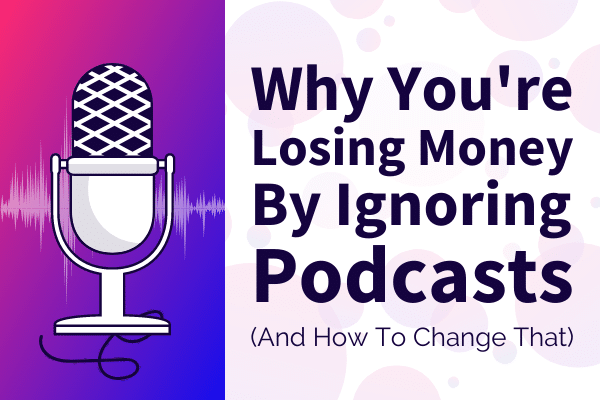When the first podcast was created in 2003, the world of mass media knew it would be something big. In fact, looking back on the first podcast, created by political radio host Christopher Lydon and software developer Dave Winer, Lydon himself is quoted as saying, “It was a huge gift from the internet. We knew we were at a turning point. I would get into my car and listen to public radio, and I thought: God, this is like dark ages. The world is never going back.” From there, Lydon and Winer’s first episode of Radio Open Source was born, proving Lydon’s previous statement correct almost immediately.
Since then, the use of podcasts has exploded across industries and across the world. Because of their flexibility and simplicity, podcasts can focus on a huge array of issues and subjects, and as a business owner, this makes them an easy way to both broaden your reach and share your ideas. It’s also a sure way to demonstrate your expertise, both to regular audience members and any potential clients that may be listening.
In this guide, that’s exactly what we’re going to discuss: why ignoring podcasts equates to losing potential revenue for your speaking business. We’ll also cover how you can change that and start your own podcast, from the ground up. 👍
The Benefits of Creating Podcasts
As mentioned before, there are numerous reasons that a podcast can be beneficial for a business owner. From marketing opportunities to sales promotions, there’s a lot to be gained by turning your message into easily-digestible audio and sharing it with the world. In this case, we’re going to look at speaking businesses, specifically, starting with the audience.
Topics on your podcast may attract unexpected audiences.
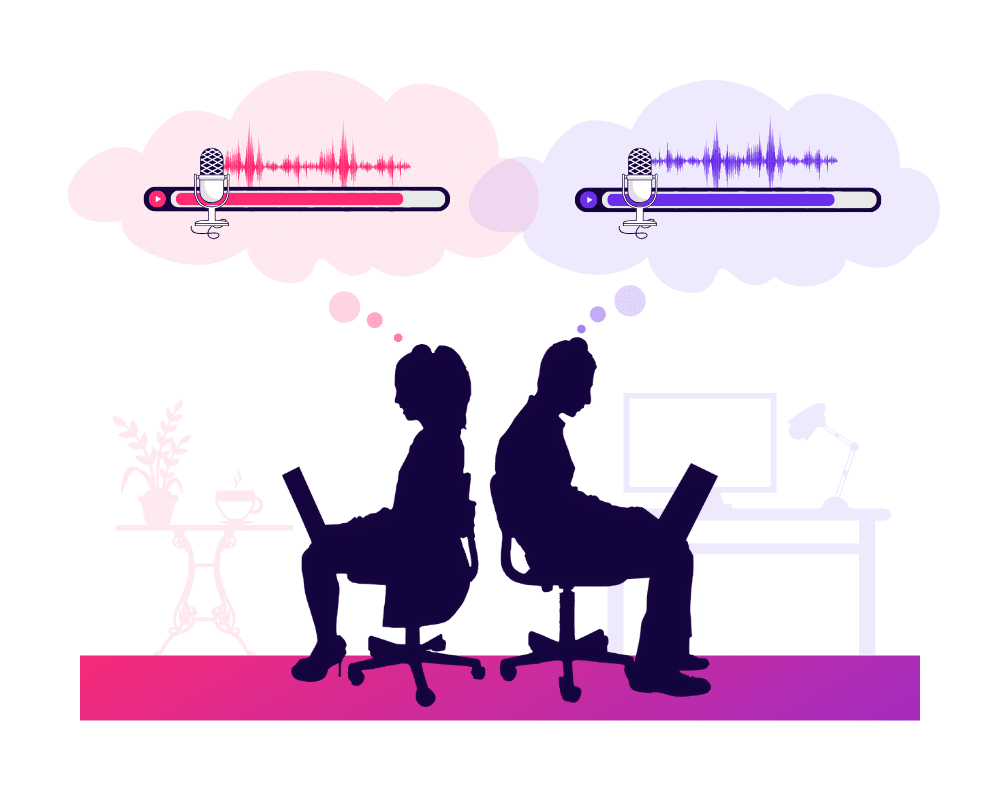
Considering one of your presentations, think about who is generally in the audience when you deliver it. Is the audience mostly female, male, or other? In what industry do they work? From there, within that industry, what are the biggest challenges and opportunities at this moment? These questions are just a few of the things you already keep in mind when keeping your presentation relevant, so that selling it to an event organizer is a breeze.
In the same way, podcasts are generally geared towards a specific audience. This can be a position, department, or even an entire industry, as a whole. Looking back on your presentations, however, creating podcast episodes is like offering different things for different sub-groups within your audience. If your podcast is about the banking industry, for example, you can cover digital banking security one week and minority inclusion in executive positions the next week. Ultimately, this flexibility and the frequency with which you can share podcasts is unique in that it allows you to provide valuable information to your general audience while still getting granular enough to provide insights for specific roles in that audience.
Additionally, in being able to cover more topics in a podcast than in a single speech, you’re not only sharing content for your existing audience. You’re also making your message available to groups outside of your focus industry. One example of this can be seen in the last paragraph, where I mentioned lack of diversity in executive roles. Although I mentioned it in the context of banking, it’s no secret that this issue is present in plenty of other industries. Likewise, your message could be suited to an audience you’re not actively considering and a podcast (being easy to find and share) could be what brings them your way.
Appearing on others’ podcasts demonstrates your expertise.

Besides attracting attention from new industries, investing time and energy in podcasts can also be a huge business-booster in your current industry. This is largely because, although most professional speakers work exclusively in their speaking business, they look more credible in the eyes of potential clients if they first demonstrate their experience outside of speaking. In other words, when you sell products or services as a speaker, remember that you are an expert first and a speaker second. This demonstrates that you know what you’re talking about, making event organizers more likely to trust and hire you. It also makes them more likely to pay a higher fee, when hiring you, but that’s a different conversation.
For now, the quickest way to further your credibility through podcasting is to appear on the podcasts of other experts in your focus industry. Whether they’re small or large players, the more you can get your name out there as a credible source, the more audience members – for all of those podcasts – will see you as an authority. Plus, when you appear on a podcast episode, the host will generally link back to your website and social profiles on their website’s page for that episode. This allows audience members to listen to you on that episode and then go straight to your website, where they can see the other content, products, and services you offer. In short, more appearances on guest podcasts means more exposure for you. Win, win!
Besides visibility, remember that industry podcasts also offer you the opportunity to network. If you’re appearing on an industry podcast, there are likely other industry professionals, sponsors, and commentators weighing in. In light of that, don’t just focus on your own episode. Keep your eyes open for future opportunities and new connections, too.
Individual episodes can promote your products or services.
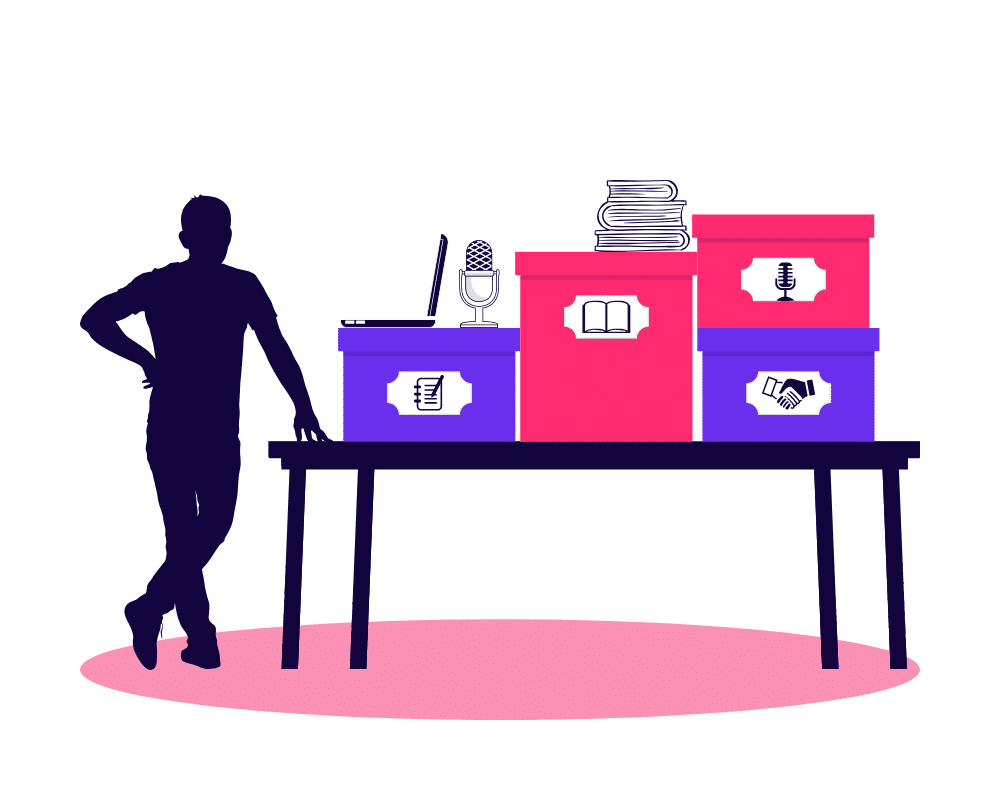
That said, appearing on industry podcasts is only the first side of the podcasting coin. On the other side is your own podcast. Ideally, when managing a podcast, there are three areas in which you provide value to your listeners, the first of which is your expertise. When it comes to knowledge, listening to a podcast is like sitting in on a mastermind group. Listeners can act like “flies on the wall” and learn from you and your guests as you share ideas. Alternatively, for more informal episodes, podcasts can act like virtual coffees between you and your listener. Even though it’s not a standard conversation and the listener can’t reply, they can still learn from your insights.
The second and third areas in which you provide value are your products and services. In most cases, podcasts act as the funnel for both of these things and the podcast itself is free. For example, if we consider the average speaker’s sales process, their podcast is at the top of the funnel, along with their blog, videos, and other free content. These provide exposure for the speaker but don’t cost the user anything. However, after accessing these things, the user will then see the value in paying for additional resources, such as books or coursework. Then, after moving down the funnel and being willing to spend more and more, they finally get to the most expensive offering: hiring you for their event.
In this way, although the podcast itself is free, you can use it to demonstrate your knowledge, validating the price of your products and services. You can also use it to mention paid offerings specifically, such as product launches or ongoing sales. It’s a long play, but we’ve seen it pay off again and again.
A solid podcast can attract sponsors and advertisers.
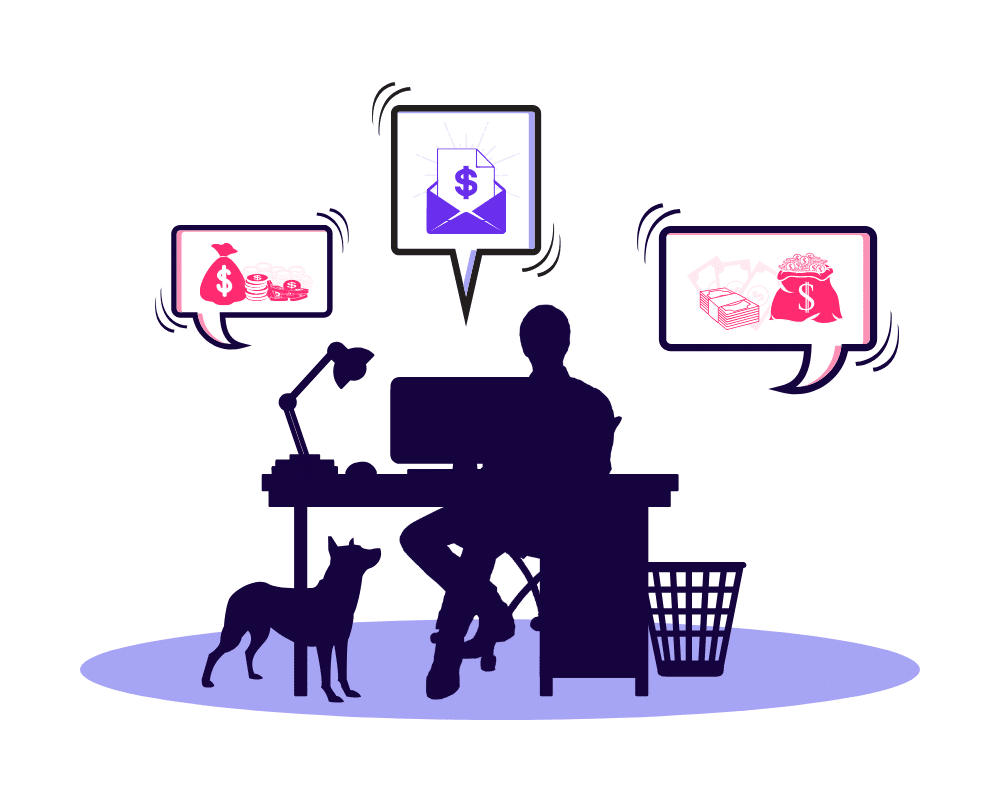
Eventually, in addition to using your podcast to promote your own services, you can also use it to promote other vendors within your focus industry. Generally speaking, there are three main ways to make this happen: attracting sponsors, selling ad time, or selling affiliate products or services. The first of these, attracting sponsors, is pretty simple. You share your insights, build your speaking business and reputation, and, as a result, vendors in your focus industry want you to share their value with your audience by using their stuff. For these vendors, their products are not only tailored to your focus industry. They also fit into your content. That way, you can actively use them while managing your speaking business and, in doing so, endorse them.
The second option, selling ad time, comes in for vendors that want to promote their business but don’t have a product that fits into your business (i.e. you can’t use it all the time). We’re all exposed to advertisements on a daily basis, so I’m going to go ahead and assume that you have a pretty firm grasp on this one already. 👍
Third, and lastly, you can also make money through podcasts by selling products or services on behalf of other vendors and collecting affiliate commissions. In the speaking industry, we see this all the time from well-established speakers who recommend software to other speakers. A good example of this is author and speaker coach Jane Atkinson, who, for many years, referred speakers to karmaSpeaker, a CRM.
In the end, all three of these options can be used together to provide a consistent source of income from your podcast. That way, you’re still technically making money from it, even though the podcast itself is free.
Each episode can easily be turned into additional content.
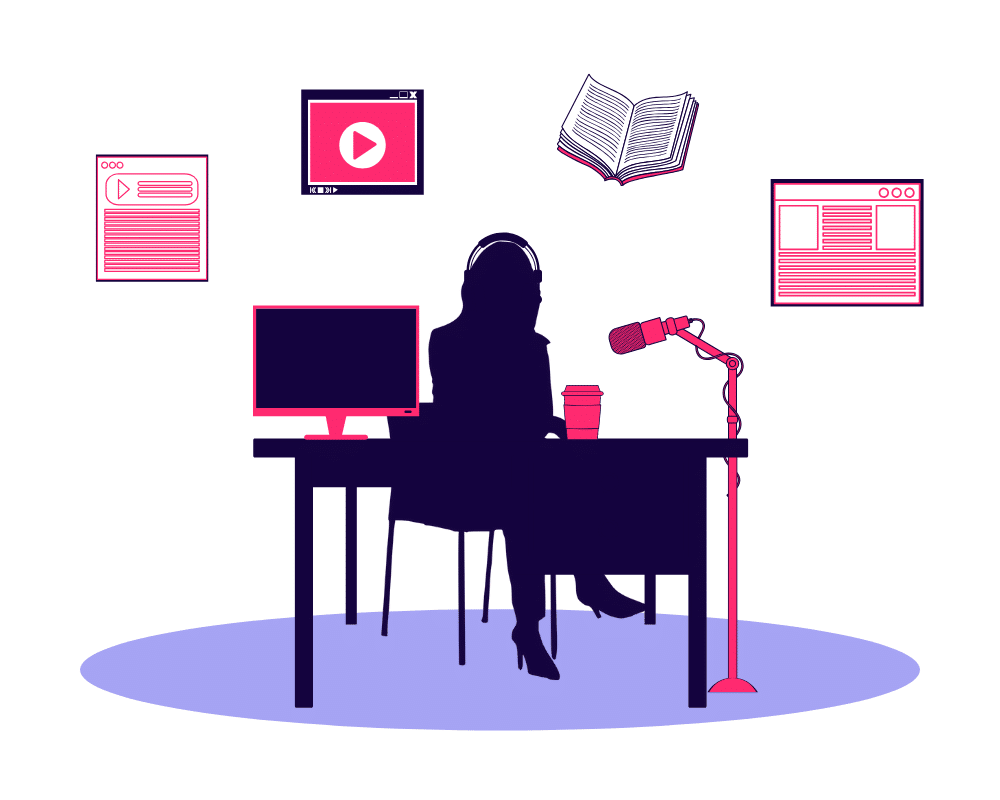
Finally, the last and perhaps the greatest benefit to podcasts is the vast variety of content that can be produced from them. I’m talking about blogs, videos, ebooks – anything that can build off of the topic of your podcast to provide more information and value for your listeners. Again, if we look at Jane Atkinson, for example, her podcast is only a piece of the puzzle in her content strategy. From each episode of The Wealthy Speaker Podcast, she writes a blog. Additionally, for several of the podcast episodes, she’s recorded video as she’s recording the podcast audio, killing two birds with one stone.
In the same way, when either (a) managing your own podcast or (b) appearing on others’ podcasts, think about how you can turn your appearance into something bigger. Essentially, the goal is to use your podcast as a part of your strategy for multi-channel marketing, or approaching leads from multiple sources. That way, no matter where someone in your industry first sees or hears you, they’ll end up on your website.
Ultimately, the amount of money you stand to make from podcasting depends on the amount of effort you put into building your own podcast and your reputation in your focus industry. It’s like we said back at the beginning of this: you’re an expert first and a speaker second. In light of that, focusing on building your personal brand and your exposure in your focus industry. Just don’t underestimate how useful podcasts can be in helping you hit those goals.
The New Podcaster’s Checklist
At this point, we’ve covered all of the reasons to invest time and energy into podcasts. Now, let’s talk specifically about starting your own! All in all, creating a podcast can be a long and detailed process. Here, we’re going to outline the four biggest steps you can take to make that process quick and easy.
Outline a schedule for creating new episodes.
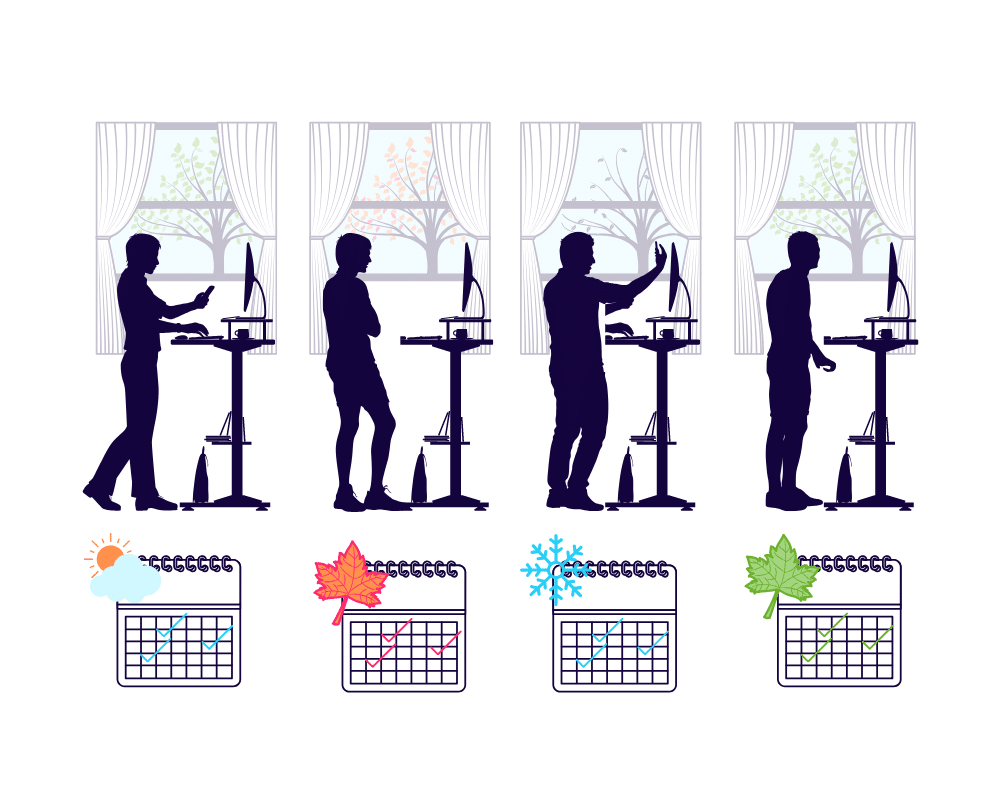
First, before anything else, make a plan for when you’re going to record your podcast. Like a YouTube channel or a TV show, people that follow podcasts want to be able to reliably know when the next episode will be available. For people creating podcasts, this means extensive planning and dedicated time for recording and editing each episode. It also means remembering the big picture and building your podcast into your existing schedule. That way, even if you’re on your way to an event, you can relax, knowing you’ve blocked off time for podcasting when you return.
Generally, according to award-winning podcaster Daniel J. Lewis, the shorter your episodes, the more frequently you should release new ones. This is partly because of the time your audience will be willing to invest into listening every day, week, or month. However, it’s also to allow you and your team the appropriate amount of time to record and edit your audio. After all, the longer your episode, the longer it’s going to take to edit it. Below are Lewis’s recommendations for podcast frequency and duration.
- 1 – 15 minutes – Post Daily
- 15 – 60 minutes – Post Weekly
- 60 minutes – Post Biweekly
- 60 – 90 minutes – Post Monthly
In addition to planning when to record your podcast, remember to plan out the “what” of each episode, too. Like blogs, podcasts are intended to focus on a specific topic within each individual post. If you plan to publish a companion blog for each podcast episode, this also means planning the written content to go along with your audio, so the two work hand in hand for your audience. Again, consistency is a key, both in creating new episodes and in the general topics and tone of each episode.
Plan out your first group of episodes.
Speaking of topics, planning out everything you’ll cover in your podcast is a good second step. Overall, the theme of your podcast should revolve around your focus industry or your area of expertise. For example, if you focus on women in business, you might tackle some of the challenges faced by women in corporate settings as well as ways to manage them. If your focus is environmentalism, you might interview an engineer or climate change activist. Whatever you choose to share, the important thing to remember is that it has to be relevant to your audience.
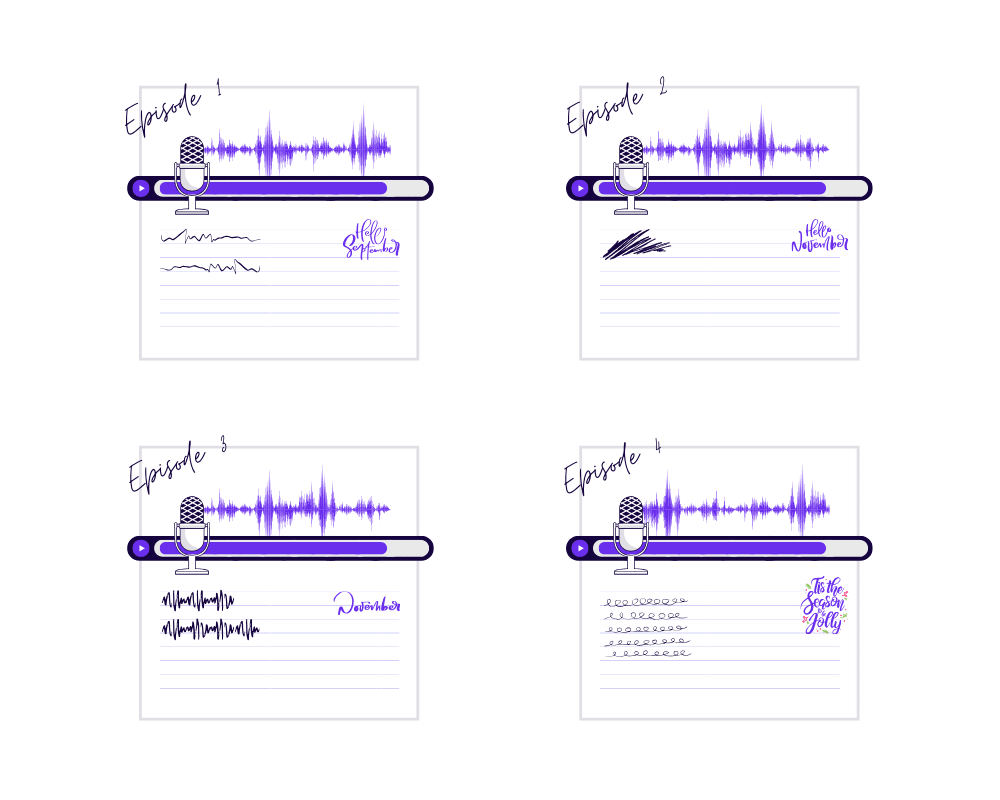
One way to ensure your content is relevant is through keyword research. To put it simply, keyword research involves analysis of search engine entries to find out how frequently people are searching for a given topic or question. This process can be done manually, by searching Google or using SEO tools, like Mangools or Ubersuggest. Alternatively, you can hire a marketing agency or keyword researcher on Fiverr to do it for you. Either way, the result is a list of words or phrases that ideally (a) are already being searched for on a frequent basis and (b) are relevant to your audience. If a word or phrase doesn’t fit both of these criteria, scratch it from your list.
From that point, after you have your list, it’s time to get to planning. Looking back on the schedule you made earlier, plan out which episodes will cover each keyword. Then write a title and description for each episode that uses the corresponding keyword. That way, after one of your podcast episodes goes live, people searching Google for the corresponding keyword will see your podcast episode in the results.
Get your tech stack together.
By now, you have your calendar and your content. All that’s left is tools! Depending on who you ask or where you look, the kinds and number of tools considering “necessary” for creating podcasts can vary greatly. However, if you’re trying to manage a handful of projects at once, this can be overwhelming and a financial strain. This is especially true if you’re a new speaker and are starting a podcast from the ground up.
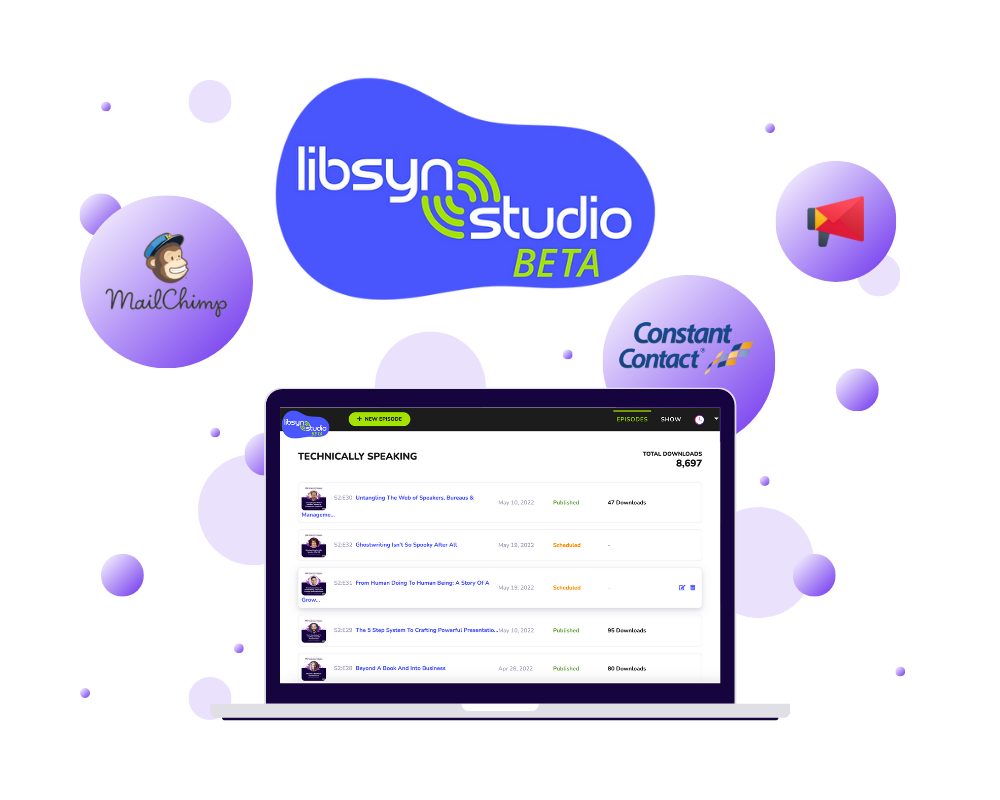
In light of these concerns, our team has compiled a short list of the most basic podcasting tools you need to get started. Although these are fairly basic, they’re what we’ve used over the last year in recording our own podcast. Hopefully, they help you, too!
- Microphone (Slate Digital VMS ML-2 Microphone or Yeti Blue Microphones)
- Headphones (Jabra Evolve 75 or Sony XM3)
- USB Audio Interface or Mixer (Focusrite Scarlett Solo)
- Adjustable Microphone Stand
- Podcast Recording Software
In our own experience, the products in parentheses above have been affordable and high-quality options that have served us well over the last year. They were also well worth the initial investment, so double-win there. 👌
In terms of recording software, specifically for podcasts, our personal favorite is Libsyn Studio. Originally created by Dan Radin as “Auxbus” in 2018, Libsyn Studio is a goldmine of resources for new podcasters. On top of AI audio mastering and episode templates, each account also comes with access to their free music library and auto-sharing to podcast streaming platforms. Put simply, Libsyn Studio allows you to publish a new episode in a matter of minutes, and we can prove it. We use it with our own podcast, Technically Speaking!
To learn more about Libsyn Studio, check out their introductory page. 👍
Start recording!
Finally, after all of the prep work is done and your software is picked out, it’s time to record. On top of the tips we’ve already covered, make sure your recording area is quiet and well organized. Like shooting a video, the goal is to have everything you need close at hand and organized professionally. That way, you won’t have to move around during the recording and resist any unnecessary noise or distractions.

Additionally, if you’re recording a video simultaneously with your podcast, prepare for recording as if you were heading into an event or recording video for an online course. Even though the podcast itself may be free to watch, you’ll want to not only stay stationary while recording but also as polished and professional as possible. Just like performing on a stage, this helps the viewer pay attention to your content rather than anything else in the video, such as your clothing or the gestures you’re making with your hands.
All of that said, above all, remember that podcasts are unique in their informality. Even though you should strive to look professional, don’t feel the need to be stiff or proper. People are listening to your podcast (and, possibly, watching your videos) because they like your message and your personal brand. Because of that, don’t be afraid to be yourself and confidently show not just your credibility on the topic at hand but also your passion for it. It’s like the most famous quote from the film, Field of Dreams: “If you build it, he will come.” In other words, when you start your podcast, show your passion for your message and for creating audio for your audience. From there, in time, listeners will come.
Additional Resources for Creating Podcasts
Although I love to share information about podcasts, who better to help than podcast creators themselves? Below are a few of my favorites and some helpful tips and tricks from their experience, creating podcasts. Additionally, for more hands-on help, feel free to contact our team! Even if you just want to connect, we’re always around to lend an ear. 😊
- “Starting Your Podcast: A Guide For Students” from NPR News
- “Getting Started Guide” from The Audacity to Podcast
- “The Equipment, Tools & Software We Use & Recommend” from The Podcast Host
- “How to Start a Podcast in 2020: The Complete Podcasting Tutorial” from Smart Passive Income


